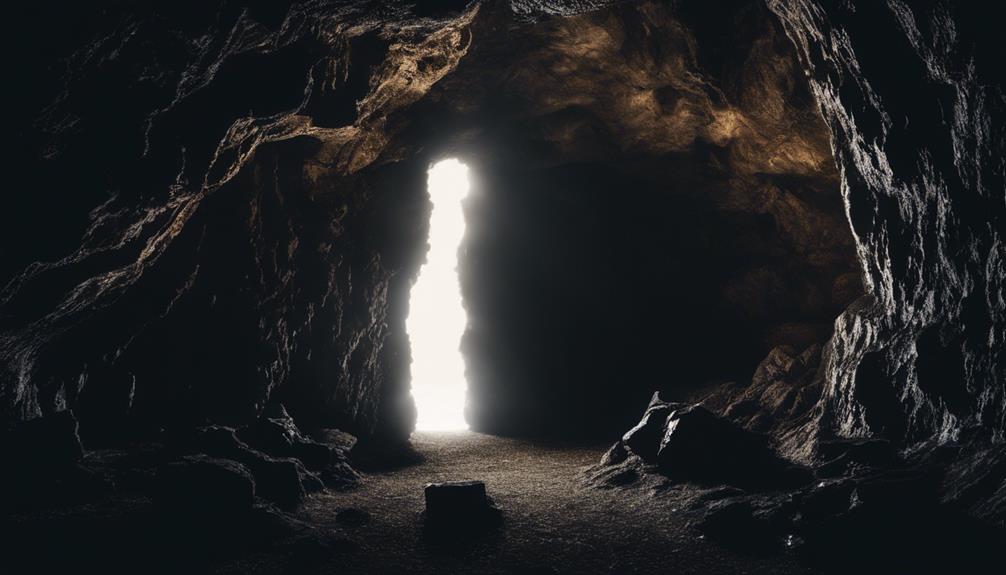Narcissists maneuver through conflicts to shield fragile egos and maintain control, using manipulation to evade responsibility. Fear of vulnerability drives them to avoid confrontation, hindering genuine connections. They retreat to protect their false image of dominance and avoid self-perception challenges. Criticism triggers hiding to protect self-esteem, impeding growth. Lack of communication escalates issues, fostering unresolved conflicts. Avoidance stifles personal development and hinders relationship growth. Their actions prioritize self-preservation over conflict resolution, creating barriers to meaningful connections. Understanding these behaviors sheds light on managing interactions with narcissists more effectively.
Key Takeaways
- Narcissists retreat to protect their fragile self-image from criticism.
- Fear of vulnerability drives them to avoid conflict and exposure.
- Control and superiority complex motivate manipulation and seclusion.
- Avoiding confrontation shields ego, hindering growth and genuine connections.
- Conflict avoidance by prioritizing self-preservation over resolution perpetuates issues.
Root of Narcissistic Behavior
When faced with conflict, narcissists often retreat to protect their fragile self-image and avoid feelings of vulnerability. This behavior stems from their deep-rooted fear of being exposed or criticized, which could shatter their grandiose facade. By hiding away, they aim to maintain a sense of control and power over the situation, using manipulation tactics to avoid facing confrontation. In doing so, narcissists perpetuate emotional abuse by evading accountability for their actions and preserving their illusion of superiority.
Their manipulation tactics often involve twisting the narrative to suit their needs, gaslighting others to make them doubt their perceptions and reality. This emotional abuse serves to further entrench their position of dominance and control. By avoiding conflict, narcissists not only shield themselves from potential shame and insecurity but also perpetuate a cycle of manipulation and emotional harm. Understanding these root behaviors can empower individuals to recognize and address narcissistic tendencies in themselves or others, fostering healthier relationships based on mutual respect and genuine communication.
Fear of Vulnerability

Retreating during conflicts, narcissists shield themselves from vulnerability and exposure, perpetuating their facade of control and superiority. The fear of vulnerability runs deep within narcissists, driving them to avoid conflict and emotional intimacy.
When faced with the prospect of being emotionally exposed or hurt, narcissists retreat into seclusion to protect their carefully crafted image of dominance. Vulnerability threatens their sense of power and superiority, so they choose to hide away instead of engaging in meaningful dialogue or resolution.
By avoiding conflict, narcissists maintain their illusion of control and avoid confronting their own insecurities. Understanding their fear of vulnerability sheds light on why they choose isolation over dealing with issues head-on. This avoidance of conflict not only perpetuates their facade but also hinders genuine connections and growth.
Recognizing this fear can help navigate interactions with narcissists, offering insights into their behaviors and motivations.
Control and Superiority Complex

When analyzing the power dynamics in conflicts involving narcissists, it's essential to understand their tactics for preserving their ego.
Their need for control and superiority drives them to manipulate situations and narratives to maintain their perceived image.
Power Dynamics Analysis
In times of conflict, narcissists assert control and demonstrate a superiority complex by withdrawing to manipulate the narrative and regain power over the dynamic.
This need for control is deeply ingrained in their behavior, stemming from an insatiable desire to maintain power and dominance in all situations. By hiding away during conflicts, narcissists aim to dictate the course of events, ensuring that their perspective prevails and their superiority remains unchallenged.
This manipulation of power dynamics allows them to evade accountability and protect their fragile ego from potential harm. Understanding this aspect of their behavior sheds light on why narcissists resort to such tactics, highlighting their relentless pursuit of control and the lengths they'll go to preserve their self-image of invincibility.
Ego Preservation Tactics
Preserving their ego and asserting control, narcissists strategically retreat during conflicts to manipulate narratives and safeguard their perceived superiority. This ego preservation tactic often involves employing the silent treatment to exert dominance and instill feelings of inadequacy in others.
By withdrawing from confrontations, narcissists aim to maintain an illusion of power and control, reinforcing their superiority complex. This behavior is a form of narcissistic abuse, where the narcissist's need for validation and admiration overrides any consideration for the well-being of others.
Understanding these ego preservation tactics can help individuals recognize and protect themselves from falling victim to manipulation and psychological harm. Setting boundaries and seeking support are essential in dealing with individuals who exhibit such controlling and superiority-driven behavior.
Fragile Ego Protection

To shield their fragile ego from potential criticism or rejection, narcissists often retreat during times of conflict. This retreat serves as a defense mechanism, allowing them to avoid facing situations that may challenge their self-perception of perfection and superiority.
By hiding away, narcissists can preserve their inflated sense of self-worth and protect themselves from feelings of vulnerability and inadequacy. The fear of being exposed or losing control drives them to avoid confrontation, as it threatens the carefully crafted image they project to the world.
Retreating during conflict serves as a way for narcissists to maintain a facade of invulnerability and avoid any potential damage to their delicate ego. This behavior isn't about weakness but rather a strategic move to safeguard their self-esteem and avoid any situations that may unravel the carefully constructed image they present to others.
Avoiding Confrontation of Shortcomings

When narcissists avoid confronting their shortcomings, they're driven by a deep fear of criticism and a fragile self-esteem. This behavior allows them to shield themselves from feelings of inadequacy and maintain their facade of perfection.
Fear of Criticism
In times of conflict, narcissists tend to retreat and hide in order to evade facing criticism and confronting their own shortcomings. Criticism triggers their fear of being exposed, challenging their false image of perfection and superiority.
Here are key reasons why narcissists fear criticism:
- Threat to False Image: Criticism threatens the facade of perfection they work so hard to maintain.
- Inadequacy: Criticism triggers feelings of inadequacy, shaking their fragile self-esteem.
- Loss of Control: Criticism challenges their sense of control and power in relationships.
- Avoidance Strategy: Hiding allows them to avoid facing their flaws and vulnerabilities, preserving their distorted self-perception.
Understanding these dynamics can shed light on why narcissists choose to hide rather than engage in conflict.
Fragile Self-Esteem
Criticism of their faults threatens the facade of perfection that narcissists meticulously craft, leading them to retreat and hide to protect their fragile self-esteem. Avoiding conflict becomes a shield for their delicate self-worth, allowing them to sidestep facing their own shortcomings.
By evading confrontation, narcissists maintain the illusion of flawlessness and superiority they project to the world. This strategy helps them avoid the discomfort of acknowledging their imperfections and vulnerabilities. Hiding away serves as a defense mechanism, shielding their ego from any potential damage that admitting faults may cause.
Embracing their fragility is challenging for narcissists, as it contradicts the image of invincibility they aim to uphold. Retreating during conflicts becomes a way to preserve their self-esteem and avoid the discomfort of self-reflection.
Impact on Conflict Resolution

During conflicts, narcissists often retreat and conceal themselves to evade feelings of vulnerability and maintain a facade of superiority. This behavior greatly impacts conflict resolution and perpetuates toxic relationship dynamics.
Here are four ways it affects the resolution process:
- Avoidance of Accountability: By hiding away and avoiding conflict, narcissistic individuals sidestep taking responsibility for their actions and addressing issues constructively.
- Lack of Communication: Concealing themselves during conflict prevents open and honest communication, hindering the ability to reach resolutions and understand each other's perspectives.
- Escalation of Issues: The tendency of narcissists to retreat can lead to unresolved conflicts festering and escalating over time, creating deeper rifts in relationships.
- Stifled Growth: Without addressing conflicts directly, there's no opportunity for personal growth or improvement in communication skills, leading to a cycle of dysfunctional interactions.
Hindrance to Relationship Development

When narcissists maneuver through conflicts to evade vulnerability, they hinder the development of relationships by impeding open communication and issue resolution. This behavior stems from their fear of being exposed or criticized, leading them to prioritize self-preservation over conflict resolution. The effects of narcissistic withdrawal can create repeated patterns of avoidance, making it challenging to build trust and intimacy. By avoiding difficult conversations and refusing to address underlying issues, narcissists create barriers to meaningful connections and emotional growth within relationships.
Establishing healthy boundaries becomes vital when dealing with relationships with narcissistic individuals. Setting clear limits on acceptable behavior and communication can help alleviate the hindrance caused by their retreat during conflicts. It's crucial to communicate openly about the impact of their avoidance and work towards finding a balance that respects both parties' needs. Understanding the dynamics at play and finding strategies to promote open dialogue can be key steps in overcoming the obstacles to relationship development posed by narcissistic behavior.
Frequently Asked Questions
Why Do Narcissists Leave When Things Get Tough?
When things get tough, narcissists leave to protect their fragile self-image and avoid feeling exposed or criticized. It's a way for them to avoid facing their own insecurities and vulnerabilities.
Hiding away allows them to maintain control and avoid accountability for their actions during conflicts. Leaving during tough times can be a tactic to manipulate the situation and regain a sense of power and superiority.
This behavior reflects their inability to handle emotional discomfort or challenges to their self-perceived grandiosity.
What Causes a Narcissist to Hide?
When a narcissist hides, it's often to shield their fragile self-image from harm. This behavior stems from a deep-rooted fear of vulnerability and a need to maintain a facade of superiority. By retreating, they aim to avoid facing their weaknesses and protect their inflated self-perception.
This withdrawal can also serve as a tactic to manipulate situations, regain power, or punish others. Ultimately, hiding in times of conflict helps narcissists safeguard their ego and avoid any damage to their grandiose self-view.
What Words Can Destroy a Narcissist?
Certain words that can deeply affect a narcissist include those challenging their superiority, exposing their flaws, or questioning their manipulative behavior. Terms like 'manipulative,' 'selfish,' or 'insecure' can provoke defensive responses due to triggering their insecurities.
Criticizing their control or empathy deficiencies may lead to intense reactions as they endeavor to regain power. Revealing the gap between their self-image and actual behavior can shatter their carefully built facade.
How Do Narcissists React to Conflict?
When facing conflict, narcissists often react with avoidance or aggression. They may retreat to protect their ego and avoid feeling vulnerable. This behavior allows them to maintain a facade of control and manipulate the situation to their advantage.
Conclusion
To sum up, narcissists hide away in times of conflict due to a fear of vulnerability, a need for control, and a fragile ego protection. This behavior hinders conflict resolution and relationship development.
It's important to recognize these patterns and address them in a constructive manner to promote healthier interactions. Remember, understanding is the first step to overcoming such challenges and fostering better connections with others.









